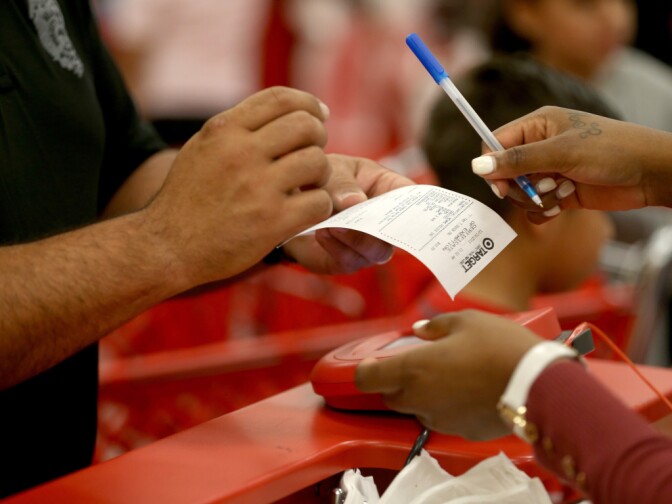This story is free to read because readers choose to support LAist. If you find value in independent local reporting, make a donation to power our newsroom today.
This archival content was originally written for and published on KPCC.org. Keep in mind that links and images may no longer work — and references may be outdated.
Most LA retail employees don't have a predictable work schedule, study finds
Justin Orkin, a Target employee in downtown Los Angeles, opened a smartphone app on Monday morning to check his schedule for the next week.
He already knew he'd be working until 10pm that night, near closing time, then coming in early the next morning for an opening shift scheduled at 7am. Orkin didn't mind picking up this "clopening" shift. He was happy to have close to 40 hours for the week.
The problem was his schedule next week.
"I'm working two days," he said, surprised by the hours shown in the app. "Which is the least amount I've worked in a long time."
Unpredictable schedules are the norm for the more than 400,000 workers stocking shelves, manning cash registers and assisting customers at retail stores throughout Los Angeles County.
That's according to a new report from the UCLA Labor Center, which finds that eight out of 10 local retail workers have schedules that change from week to week, and 77 percent receive their schedules a week or less ahead of time.
Based on surveys with hundreds of Los Angeles retail workers, the report also finds:
- 62 percent said they're expected to have "open availability" throughout the week, allowing managers to decide what days and times to schedule them.
- 44 percent said their schedules can fluctuate by more than 10 hours from week to week.
- 20 percent said they've been "on call," meaning they're required to stay on standby during certain hours in case they're called in to work.
- 44 percent said they've worked clopening shifts.
- 45 percent of the workers who need child care said they've been turned away from daycare centers because their schedules are unpredictable.
- 43 percent of the workers who go to school said they've missed class due to work.
The UCLA survey builds on a 2016 report that found young service workers in L.A. also deal with unpredictable scheduling and have little say over their hours.
Co-author Janna Shadduck-Hernandez said the minimum wage may be rising for workers throughout California, but scheduling issues can keep them from making ends meet. Los Angeles retail workers earn a median annual income of $21,139. When they're expected to keep their availability open, they can't make time for other streams of income.
"It doesn't allow them to get another job," Shadduck-Hernandez said. "We found that one in two workers were late paying a bill, because they were not making enough money to consistently cover their expenses."
Rachel Reyes, a local store manager for a smaller apparel chain, said scheduling around her team's needs can be tricky. Some of the workers at her store are students. One is a mother. But she said it's important to give plenty of advance notice in scheduling.
"People have lives outside of work," she said. "I can't imagine having to live a life where you don't know what you're doing two or three days in advance."
Retailers who routinely call workers in at the last minute should rethink their approach, argues Reyes — if not for their workers, then for their bottom line.
"The happier your employees are, the more money you'll make," Reyes said. "That is something I've seen."
Reyes, a member of the local chapter of the Democratic Socialists of America, will be one of the speakers at a Wednesday morning press conference put on by the UCLA Labor Center and the Los Angeles Alliance for a New Economy. The organizations will call for changes to scheduling practices in L.A.'s retail industry.
In recent years, cities like Seattle and San Francisco have passed "fair work week" legislation that includes requirements such as posting schedules two weeks in advance and providing "predictability pay" when managers change a worker's schedule on short notice.
The retail industry has chafed at the idea of regulating how their workers are scheduled. In an emailed statement, National Retail Federation executive David French said people choose to work in retail in part because they're looking for a flexible work environment.
"Restrictive scheduling mandates would only harm local businesses and limit opportunities for workers climbing the economic ladder," French wrote.

Justin Orkin, the downtown Los Angeles Target worker, said he likes having flexibility to plan around his shifts. He uses that time for creative pursuits, like screenwriting. He recently worked on the set of an upcoming short film.
At Target, Orkin makes $12.50 an hour. He recently transferred to the store's grocery section. He's excited about the move, but plans to ask his manager about his big drop in hours next week.
"It might be that there's just a lot of people working in that section right now, and there's not enough to go around," Orkin said. "We'll see what he says."
Target spokeswoman Susie Bell would not say if the company has any policies on "clopening" shifts or variable hours from week to week. In an emailed statement, she noted Target employees receive their schedules at least 10 days in advance and are never scheduled to be on call.
"A key component of Target’s ability to attract store team members is our ability to offer a variety of schedules to meet the needs of our diverse team member population," the statement read.









